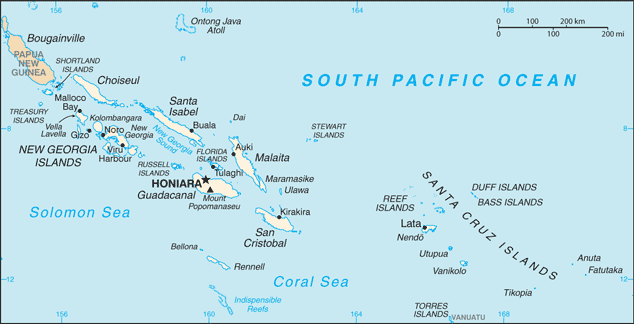
Australia has dispatched some 100 police and military troops to the Solomon Islands following days of rioting and looting in the capital Honiara. Papua New Guinea has also sent in troops, and Fiji says a contingent is en route. Calling for Prime Minister Manasseh Sogavare to resign, protesters attempted to set the parliament building ablaze, and torched and looted shops, causing millions of dollars in damages. The looting centered on the city’s Chinatown, where three charred bodies have been found amid the ruins.
Most of the protesters are reportedly from the island of Malaita, where people have long complained of neglect by the central government. Settlers from Malaita have increasingly been moving to Honiara, on the central island of Guadalcanal, for work over the past generation. This had led to tensions between the Malaita islanders and the “Guales,” which erupted into violence in 1999, with a four-month state of emergency imposed.
Malaita’s provincial government also strongly opposed the central government’s decision to switch diplomatic recognition from Taiwan to the People’s Republic of China. The Solomons were among a dozen Pacific island states that recognized Taiwan until the 2019 “switch,” as it is locally known. Taipei accused Beijing of using “dollar diplomacy” to sway small countries in the region to shift recognition. In the lead-up to the “switch,” Chinese firms poured investment into the Solomons, especially for roads and other infrastructure to revive the mothballed Gold Ridge mine on Guadalcanal. There was even a bid, ultimately rejected by the central government, for Beijing’s China SAM Enterprise Group to lease the entire island of Tulagi as a port facility.
Malaita’s premier Daniel Suidani meanwhile issued an “Auki Communique” (named for the provincial capital) dissenting from the switch, and barring all Chinese investment from the province. The Communique played to social conservatism, citing the “Christian faith” of the local population and the “atheist ideology” of the Chinese state. Suidani also pointedly traveled to Taiwan this June for medical treatment—a trip condemned by the central government as “unauthorized.”
Sogavare responded to the uprising by saying it had been fomented by foreign powers with an “evil intention” to topple him, adding that they have a “very big…influence. I don’t want to name names. We’ll leave it there.” But there was little doubt he was talking about the United States and Taiwan.
Only 15 countries around the world now continue to maintain diplomatic recognition of Taiwan. (Reuters, AP, AP, NYT, WaPo, SCMP, Al Jazeera, Al Jazeera, Al Jazeera, The Diplomat, The Guardian, Asia Pacific Report)
A few observations… First, it is maddening that (yet again) doubtlessly legitimate economic grievances are being siphoned off into pointless xenophobia. Even if those grievances are in part linked to Chinese neo-mercantilism in the Solomon Islands, venting deadly rage on Chinese immigrant shop-owners is ugly scapegoating that only serves to delegitimize the uprising. That said, it is certainly a perverse historical irony to see China treating the Solomon Islands the same way the Great Powers of yestercentury treated China during its “Century of Humiliation“—a point we have made before.
As for the diplomatic angle at work here, we will point out that if it weren’t for the absurd “One China” fiction, governments could recognize both Taiwan and the PRC. If the long taboo on this solution is now eroding in Taiwan, it is more of an entrenched dogma than ever in Beijing.
It is a final irony that Australia, now notoriously spatting with China, is basically serving here as Beijing’s regional enforcer. This responsibility falls to Australia because it is officially under the same sovereign (Queen Elizabeth) as what had been until 1978 the British Solomon Islands Protectorate. So the remnant structures of British colonialism are now effectively serving the interests of Chinese neo-mercantilism. For all the resurgent inter-imperial rivalry, the contemporary world powers ultimately have everything invested in “stability”—the uninterrupted functioning of the global capitalist leviathan—and will close ranks when push comes to shove. That’s why they call it a Great Game.





Solomon Islands PM survives vote, blames ‘Taiwan agents’
Embattled Solomon Islands Prime Minister Manasseh Sogavare survived a no-confidence vote Dec. 6, while accusing “Taiwan’s agents” of orchestrating recent political violence that plunged the Pacific island nation into crisis. (France24)
China lodges protest after PNG riots
The PNG government has declared a state of emergency after at least 16 people were killed in riots and looting. The discord erupted Jan. 10 after police staged a walkout due to a pay cut that the government later blamed on a technical glitch. By the following day, the capital, Port Moresby, had descended into violent protests. The government sought help from China and has placed 1,000 troops “on standby” should more trouble arise.
Beijing has lodged “solemn representation” with Papua New Guinea and called on the country to “penalize perpetrators severely,” saying the riots resulted in the looting of Chinese-owned properties and injury to Chinese nationals. (TNH, SCMP)
Dozens killed in Papua New Guinea massacre
Papua New Guinea authorities reported Feb. 19 that at least 49 people have been killed in a massacre in the remote Highlands region. Reports found that it is “very likely to be one of the deadliest massacres in the highlands in recent history.”
The massacre happened in the village of Wapenamanda, Enga province, and was allegedly related to the ongoing tribal disputes in the region. The majority of the deceased were members of the Sikin and Kaikin tribes. (Jurist)